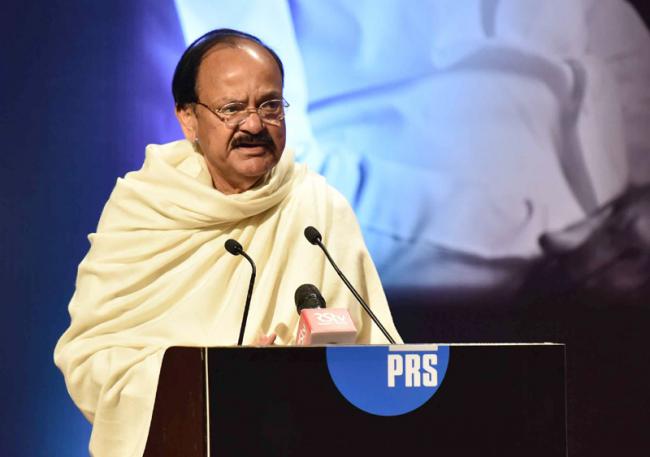
NIDM Centre to help southern states build infrastructure to tackle multiple disaster challenges: Naidu
New Delhi, May 22 (IBNS): Vice President of India M. Venkaiah Naidu has said that Southern parts of the country are prone to multiple disaster challenges - hence require the NIDM Centre to help these states build infrastructure to tackle disasters.
He was addressing a gathering after laying foundation stone for National Institute of Disaster Management, in Kondapavuluru, Andhra Pradesh on Tuesday.
Minister of State for Home Affairs Kiren Rijiju, the Minister for Law & Justice, Andhra Pradesh, Kollu Ravindra and other dignitaries were present on the occasion.
The Vice President said that India needs a disaster resilient infrastructure and provide life-line services to the most vulnerable communities.
He further said that events of natural disasters are on the rise, and India is the most affected region.
"We have witnessed wide spread natural calamities in the past ranging from floods to earthquakes, landslides and cyclones like super cyclone of 1999, Gujarat earth quake 2001, South Indian Tsunami in 2004, Mumbai Flood 2005, Kashmir earthquake of 2005, Kosi flood in 2008, Sikkim earthquake of 2011, Phailin and Hud Hud in 2013 and 2014," he added.
The Vice President said that nearly 59% of India’s land area is prone to earthquakes of moderate to very high intensity.
"Over 40 million hectares (12% of land), is prone to floods, about 5700 kms coast line is cyclone prone and exposed to tsunamis and storm surges, 2% of land is landslide prone, and 68% of India’s arable land is affected by droughts," he noted.
The Vice President said that flooding in the cities and the towns is a recent phenomenon caused by indiscriminate encroachment of water ways, inadequate drainage system and lack of maintenance of the drainage infrastructure.
He further said that these disasters do not only disrupt people’s lives and directly affect the disaster-hit areas, but they also jeopardize the entire society and economy of the country.
"In fact, one single disaster can overwhelm the GNP of the country," he added.
The Vice President said that since 90 percent of the disaster-affected populations are in Asia, it is indeed important for the population to be informed of potential disaster threats.
Naidu said that they should also be equipped with sufficient knowledge and skills to protect their lives and properties.
"Though we have been actively pursuing a paradigm shift in disaster management from a relief centric approach in the past to a holistic one, that encompasses preparedness, prevention, mitigation and risk reduction much needs to be done in the context of resilient infrastructure and life-line services to the most vulnerable communities," the minister said.
The Vice President said that as Disaster Management approach is a multi-disciplinary process, the Ministry of Home Affairs has been mandated to play role of coordination as the Administrative Ministry.
He further said that the success of early warning and preparedness was demonstrated during the recent cyclones ‘Phailin’ ‘Hudhud’ in Odisha and Andhra Pradesh respectively.
"Warning messages, including coordinates of the impending cyclone’s location and intensity, were communicated prior to the landfall," said Naidu.
The Vice President said that India is a party to the Sendai framework for Disaster Risk Reduction (2015-30), which has now provided us a more practical and useful document with people-centered preventive approach to disaster risk.
"This would contribute to the reduction of disaster risks and strengthen resilience of the poor and the most vulnerable," said he.
Support Our Journalism
We cannot do without you.. your contribution supports unbiased journalism
IBNS is not driven by any ism- not wokeism, not racism, not skewed secularism, not hyper right-wing or left liberal ideals, nor by any hardline religious beliefs or hyper nationalism. We want to serve you good old objective news, as they are. We do not judge or preach. We let people decide for themselves. We only try to present factual and well-sourced news.






